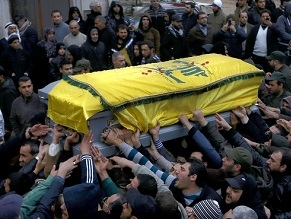|
World Jewish News

The assassination of Hezbollah leader Hassan al-Laqees on Tuesday night is believed to be a sign of growing tensions between Shiites and Sunnis in Lebanon over the ongoing Syrian civil war. Via The Foreign Bureau, WSJ's global news update. Photo: AP
|
Hezbollah Commander Killed in Lebanon
05.12.2013, Israel and the World A senior commander of the Shiite militant group Hezbollah was gunned down outside his home overnight in an assassination that appeared to be part of escalating sectarian violence spilling over into Lebanon from the Syrian civil war.
Hassan al-Laqees was an elusive figure, a member of Hezbollah since its early days and a close friend of the group's leader, Hassan Nasrallah, relatives and friends said. Mr. Nasrallah would stay at Mr. al-Laqees' home in Baalbek when he visited, town residents said Wednesday.
There were various accounts about his role in the organization. A former Israeli intelligence official said he was believed to be chief of rocket development while Iran's semiofficial Fars News Agency said he was in charge of communication and technology networks.
Hezbollah is allied with Shiite Iran and both support the Syrian regime of Bashar al-Assad, which is dominated by Alawites, an offshoot of Shiite Islam. They are all fighting Sunni-dominated rebels in Syria, some of them backed by Saudi Arabia and other Sunni Gulf nations.
The Syrian war has heightened sectarian tensions in the region, particularly in neighboring Lebanon, which was mired for 15 years in its own civil war from 1975-1990. Lebanon is also deeply divided along sectarian lines with large communities of Shiites, Sunnis and Christians that make it vulnerable to growing militant violence.
A previously unknown group calling itself the Free Sunnis of Baalbek Battalion claimed responsibility, saying the "jihadist operation was implemented by free Sunni lions from Lebanon" in a Twitter message. The reference to Sunnis suggested sectarian motives.
Later, another previously unknown group calling itself the Battalion of the Muslim Umma also claimed responsibility.
Hezbollah blamed Israel, saying Mr. al-Laqees had survived previous assassination attempts. But Israeli officials strongly denied involvement—a rarity, as Israel usually refuses to confirm or deny involvement in such operations. Israeli officials have, however, acknowledged that they tried to kill Mr. al-Laqees before in 2006, when Hezbollah and Israel fought a monthlong war. The commander's son was killed in that war.
Mr. al-Laqees, who was in his 50s, was gunned down as he returned home from work around midnight just outside one of his homes in the busy Beirut suburb of Hadath, Hezbollah said. He had always refused to be accompanied by security detail, a relative said.
Neighbors of his home in Hadath said they didn't even know a Hezbollah commander lived in their midst.
He had two wives and five children.
Hezbollah supporters and Lebanese officials said this was a blow to the group's inner circle. He was the highest level member killed since the February 2008 car bombing that killed senior commander Imad Mughniyeh in the Syrian capital Damascus.
"We haven't seen a killing of a Hezbollah commander in Lebanon like this in five or six years," a Lebanese official said.
He was killed minutes after a live interview with Mr. Nasrallah aired on television. The relative and a Hezbollah official said they believed he was returning home after accompanying Mr. Nasrallah to the interview as part of his security entourage. But their account could not be independently verified.
TV stations broadcast images of muddy footprints of his assailant and the blood-spattered driver's seat where he was slain.
"It is either Saudi Arabia or Israel. There is no third possibility," said a man in his 50s who knew Mr. al-Laqees and was among thousands who attended the rainy funeral procession.
They walked behind the casket draped in Hezbollah's yellow flag, chanting slogans such as: "Israel, you are the enemy of Muslims. America, you are the great Satan."
Some of Hezbollah's allies pointed the finger at Saudi Arabia, blaming the kingdom for feeding the cycle of violence in Lebanon. Some of the country's unrest has been blamed on Sunni extremist groups linked to al Qaeda in retaliation for Hezbollah's support of the Syrian regime.
Lebanese President Michel Suleiman warned Wednesday against making accusations that could jeopardize Saudi-Lebanese relations.
Mr. Nasrallah, in the interview broadcast just before the killing, blamed Saudi Arabia for propping up al Qaeda units across the Middle East to "fight through proxies." The interview with the local OTV network was carried by Hezbollah's news website, al Manar.
"Saudi intelligence is behind many of the bombings in Iraq, and operates some branches of al Qaeda," Mr. Nasrallah claimed. He accused the Saudis of being behind the deadly bombing of the Iranian Embassy in Beirut two weeks ago, which was claimed by the Abdullah Azzam Brigades, an al Qaeda offshoot.
The twin suicide blasts killed more than 25 people—including the Iranian cultural attaché.
By Rima Abushakra And Maria Abi-Habib
The Wall Street Journal
|
|
